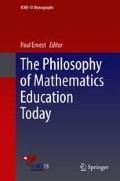Abstract
The chapter presents a philosophical approach to teaching and learning mathematics in which five philosophical methods are translated into methods of reading and writing mathematical texts. The philosophical approaches are Hermeneutics, Analytical philosophy, Dialectics, Experience based (phenomenological) and Speculative philosophy. We use the acronym HADES for the combination of these approaches. For each of them we present reading and writing material which can be used for teaching peer tutors and by them in their interaction with students.
Access this chapter
Tax calculation will be finalised at checkout
Purchases are for personal use only
References
Barrow, I. (1976). Lectiones Geometricae. Hildesheim: Georg Olms.
Bean, J. (2011). Engaging ideas: The professor‘s guide to integrating writing, critical thinking, and active learning in the classroom (2nd ed.). San Francisco: Wiley.
Bloch, E. (1963). Tübinger Einleitung in die Philosophie (Vol. 1). Frankfurt/M.: Suhrkamp.
Elbow, P. (1973). Writing without teachers. New York: Oxford University Press.
Frege, G. (1953). The foundations of arithmetics: A logico-mathematical enquiry into the concept of number (2nd ed.). Oxford: Blackwell.
Gadamer, H. G. (2010). Wahrheit und Methode (7th ed.). Tübingen: Mohr Siebeck.
Hodds, M., Alcock, L., & Inglis, M. (2014). Self-explanation training improves proof comprehension. Journal for Research in Mathematics Education, 45, 62–101.
Husserl, E. (1970). The crisis of European sciences and transcendental phenomenology: An introduction to phenomenological philosophy. Evanston, IL: Northwestern University Press.
Hyland, K. (2010). Metadiscourse: Mapping interactions in academic writing. Nordic Journal of English Studies: Special Issue on Metadiscourse, 9, 125–143.
Jahnke, H. N. (Ed.). (2009). Geschichte der Analysis. Heidelberg: Spektrum Verlag.
Knipping, C., & Reid, D. (2014). Reconstructing argumentation structures: A perspective on proving processes in secondary mathematics classroom interactions. In A. Bikner-Ahsbahs, C. Knipping, & N. Presmeg (Eds.), Approaches to qualitative research in mathematics education (pp. 75–101). Dordrecht: Springer.
Krummheuer, G. (2003). Argumentationsanalyse in der mathematikdidaktischen Unterrichtsforschung. Zentralblatt für Didaktik der Mathematik, 35, 247–256.
Lorenzen, P. (1969). Normative logic and ethics. Mannheim: Bibliographisches Institut.
Lorenzen, P., & Lorenz, K. (1978). Dialogische Logik. Darmstadt: Wissenschaftliche Buchgesellschaft.
Martens, E. (2003). Methodik des Ethik- und Philosophieunterrichts: Philosophieren als elementare Kulturtechnik. Hannover: Siebert.
Nida-Rümelin, J., Spiegel, I., & Tiedemann, M. (Eds.). (2015). Handbuch Philosophie und Ethik: Didaktik und Methodik (Vol. 1). Paderborn: Schöningh.
Peirce, Ch. (1997). Pragmatism as a principle and method of right thinking: The 1903 Harvard lectures on pragmatism. Albany, NY: SUNY Press.
Rohbeck, J. (2008). Didaktik der Philosophie und Ethik. Dresden: Universitätsverlag.
Russell, B. (1948). Human knowledge: Its scope und limits. London: George Allan & Unwin.
Schnieder, J. (2013). Mathematikdidaktische Potentiale philosophischer Denkrichtungen. In I. Bausch, T. Wassong, R. Hochmuth, R. Bruder, P. Fischer, & R. Biehler (Eds.), Mathematische Vor- und Brückenkurse (pp. 197–212). Heidelberg: Springer Spektrum.
Toulmin, S. (1958). The uses of argument. New York: Cambridge University Press.
Waldenfels, B. (1992). Einführung in die Phänomenologie. München: Fink.
Author information
Authors and Affiliations
Corresponding author
Editor information
Editors and Affiliations
Rights and permissions
Copyright information
© 2018 Springer International Publishing AG, part of Springer Nature
About this chapter
Cite this chapter
Paravicini, W., Schnieder, J., Scharlau, I. (2018). Hades—The Invisible Side of Mathematical Thinking. In: Ernest, P. (eds) The Philosophy of Mathematics Education Today. ICME-13 Monographs. Springer, Cham. https://doi.org/10.1007/978-3-319-77760-3_23
Download citation
DOI: https://doi.org/10.1007/978-3-319-77760-3_23
Published:
Publisher Name: Springer, Cham
Print ISBN: 978-3-319-77759-7
Online ISBN: 978-3-319-77760-3
eBook Packages: EducationEducation (R0)

